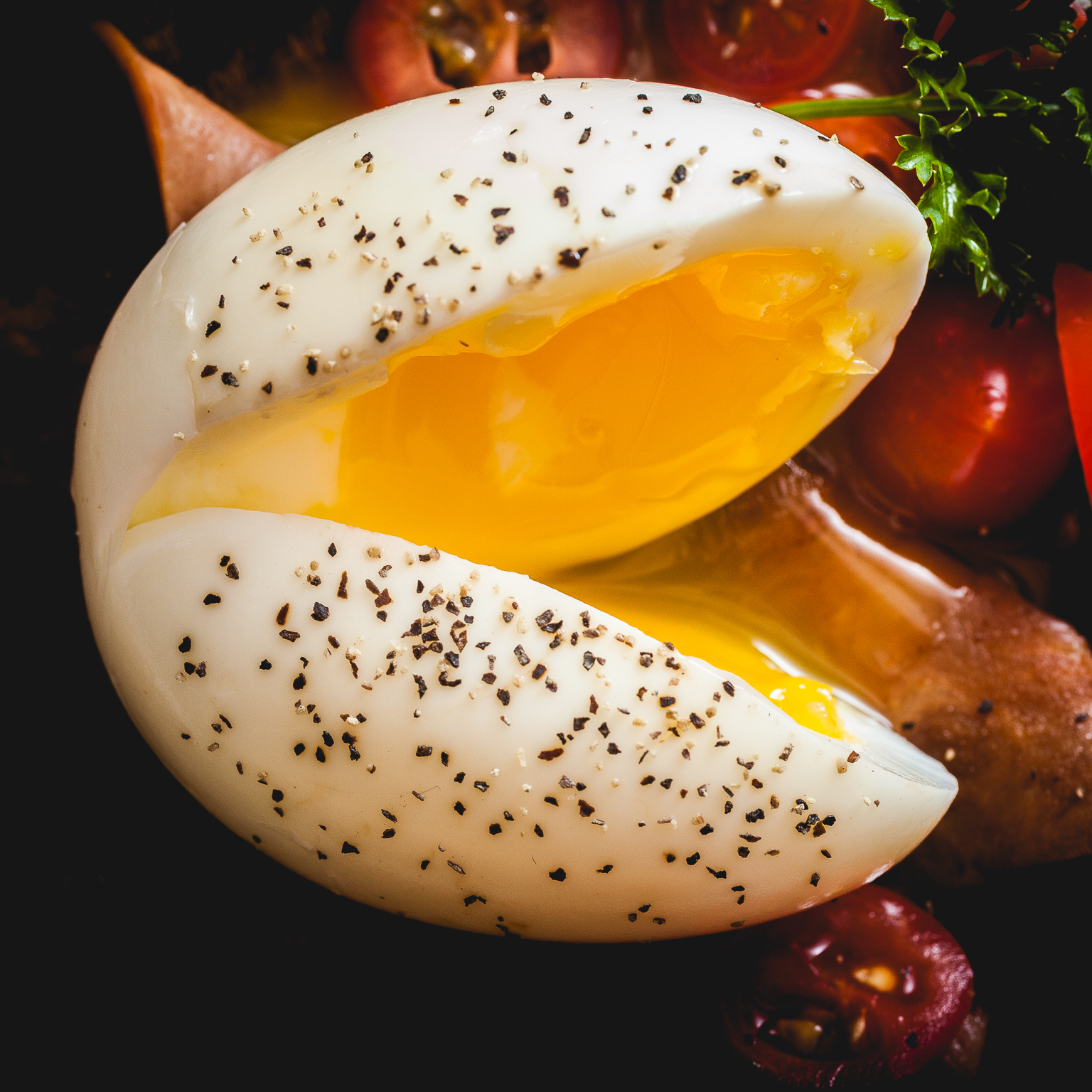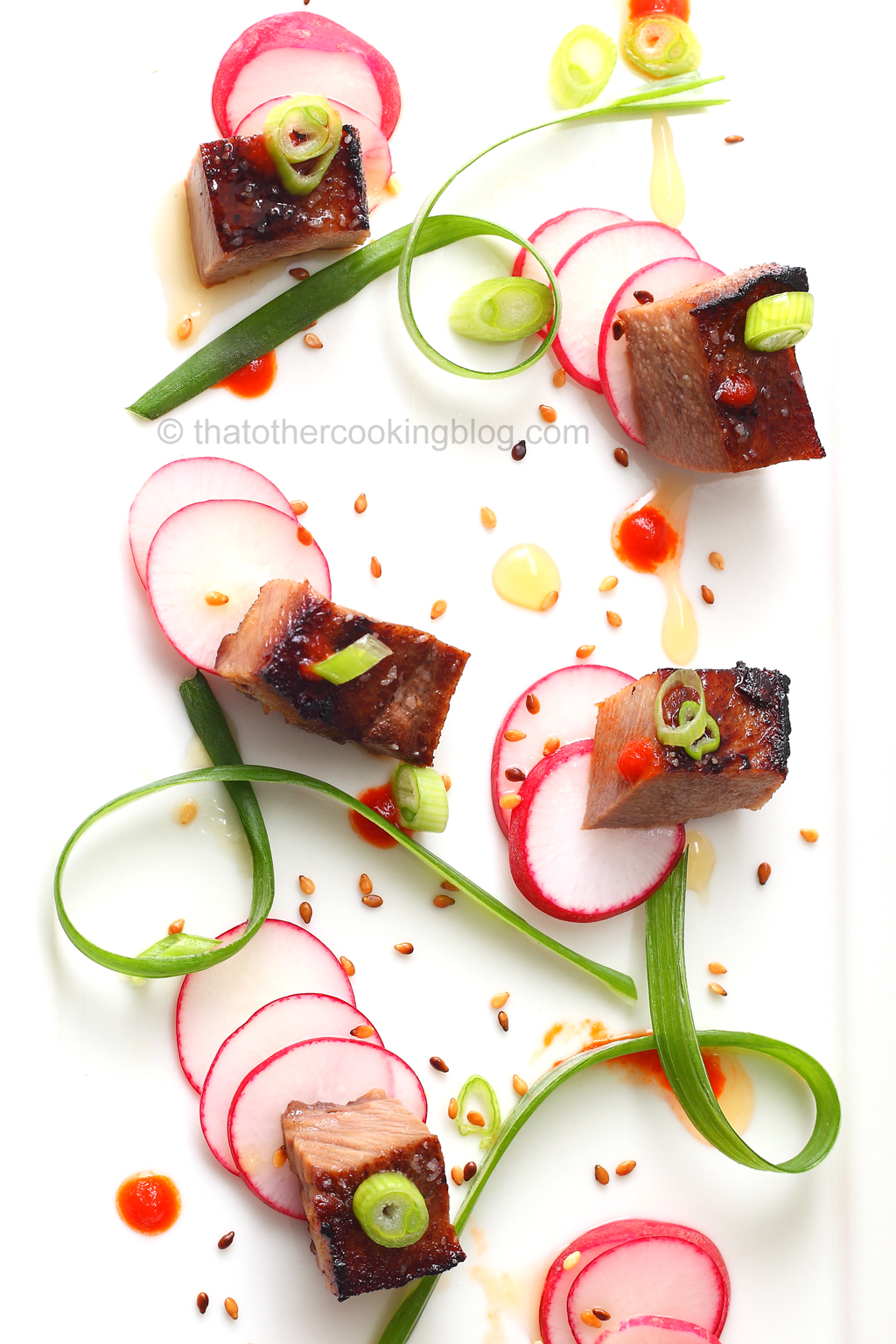I love eggs and I love cooking them. They have been a constant in my cooking even before I took on cooking more seriously later on. Since I was little I loved cooking eggs. I remember hard boiling eggs with my mom, making omelettes, etc. Today… on a skillet, eggs have to be cooked as gently as possible… I love walks on the beach and sunsets and all that and I also love egg whites with no browning at all and egg yolks runny but not cold. It’s a fine balance and a fun challenge when making eggs for breakfast. My house could easily be an all-day breakfast joint. I love breakfast and I mostly it at non-breakfast times because either I’m too late for work or I feel way too lazy until about noon on weekends. Although… that’s not true… but some would disagree.
Do you need boiling water to cook eggs?
The terms hard-boiled or soft-boiled are a bit misleading. Specially at sea level 🙂 Eggs don’t need to reach 212F (100C) to get cooked. They cook way below boiling temperature but for the purpose of this post, let’s assume we’re using boiling water to cook them eggs which is what we’re all most familiar with. We can get into sub-boiling temp egg cooking at another time. Sous vide time can wait. You sous vide enthusiasts out there are familiar with the concept of waiting, so let’s wait.

The 10 minute egg.
Cooking soft boiled eggs can be tricky. There are way too many variables. Specially temperature-related variables which are difficult to control if not impossible, but let’s just say that within a reasonable margin of error they can be controlled. The more we know about the variables we wanna control the better. Let’s for now only focus on 2:
- Temperature of the egg.
- Temperature of the water.
What’s the internal temperature of an egg?
Cold eggs? room temperature eggs? somewhere in between? yeah.. I’m overwhelmed my self thinking about it and it’s not like we can stick a probe thermometer into an egg. Some people are ok with surprises and would “wing” it being ok with whatever outcome… sometimes, soft boiled eggs will be there, sometimes, overcooked rubbery HARDboiled instead…yay. Some people like you and me… we prefer to predict the result. Just like roasting or baking… it’s all the same. Controlling the outcome.
So what’s the internal temperature of an egg…. I don’t even wanna think about it. I usually store eggs in the fridge because cold eggs are more “robust”, the yolks don’t break as easily and that makes handling eggs easier. I don’t think eggs necessarily need to be store in the fridge though. They are just fine a room temperature for a long time. Anyways, if you store your eggs in the fridge which most people do… then you’re half way there. That’s the temperature of our 10 minute egg before cooking. Fridge temp.
How much water do I need?
This is a tricky one. The number of eggs you’re cooking determines the cooking time period. It’s like microwaving water cups, time goes up as you add more water cups which means… more heat will need to be applied for longer to get to the same to the temperature. So, what’s the formula? how much water do I need? well… cooking science isn’t perfect… at least not in my kitchen… but say you have a pot that can hold 8 eggs. If the eggs are fresh they will sink to the bottom which means they will displace water equal to their volume which also means, you probably won’t need to add more water. The eggs should all lay in one layer at the bottom of the pot and the water level should cover them. That’ how much water you need.
Does the water need to boil before I add the eggs?
No, that’s the beauty of this approach. Add fridge-cold eggs to a pot over hight heat with enough tap water to cover them, set the timer to 10 minutes and go away. There isn’t much else to it. I love simplification. Keep reading if you wanna soft-boil more than 1 or two eggs at a time.

10 minutes for 10 eggs?
Ok, you’re right, 10 minutes for ONE egg doesn’t mean 10 minutes for 10 eggs or however many eggs you wanna cook. Like I said, there are many variables and the pot size is one of ’em. If you had a pot full of water the size of the planet it would never boil by applying heat from your little kitchen stove. So the size of the pot is important. The amount of water is important and the temperature of the eggs is important. To simplify things, let’s assume your eggs are fridge temperature, your pot fits the eggs snuggly and they all lay in one layer at the bottom of the pot barely covered with water. Then, add about 30 seconds per additional egg to the end cooking time. So 1 egg = 10 minutes then 10 eggs = 14.5 minutes. I hope I got that right.
Why is the math linear?
I don’t think it is. But non-linear math would be a horrifying thing to calculate specially for me. So as long as the number of eggs being cooked isn’t more than a few… 10 or so, you should be good (batch cooking, anyone?!). If you’re doing 1000 eggs in one pot… good luck to you. The same methodology doesn’t apply to larger number of eggs mainly because the heat source remains the same as you add more stuff to the pot to heat up so things like dissipation, entropy and other cool concepts come into play and will ruin your day. The water amount might remain the same but the surface area will increase as more eggs get added to the pot meaning more energy will be required to cook them eggs not to mention the eggs are cold from the fridge and that “carryover coldness” will require more heat to warm them eggs up. It’s like heating up and ice bath as opposed to heating up tap water. More energy. More heat. Anyways, who needs to soft boil more than 10 eggs at a time, right? 🙂
If you guys have any ideas on soft boiling eggs by the numbers or any egg cooking science, let me know. I’d love to get your input!

Have fun!
Wanna get more sous-vide cooking guides and cool cooking how-to’s in your mailbox? You know what needs to be done!
We never spam. You should only be getting updates when new content is posted on the site. We also respect your privacy. We don’t share your email address with anyone and you can unsubscribe anytime!




2 comments
And then there is the freshness of the eggs, shape and material of the pot. And as soon as the water boils and you keep the heat high enough to keep it boiling, the amount of eggs, amount of water, size, shape and material of the pot won’t matter anymore. So in the end it’s experience that counts. As a kid, I always boiled eggs for Sunday breakfast. Always the same number (4) and size of of eggs, at the same temperature, about the same freshness, same amount of water, starting with the eggs in cold water. And after a while I had figured out the right cooking times, starting the timer when the water was boiling: 3 mins for soft (my father and me), 4 mins for my mother (yolk starting to set), 5 mins for my sister (almost hard boiled). Of course as a 7-year-old I didn’t really know about the science, so the first time I started analyzing this was years and years later 😉
hahaha nice, I wish I had had that sort of experience growing up, my mom and I would eyeball it all the time and I only until recently I started paying attention to egg cooking more carefully. And then when I started cooking sous vide I learned a ton more. Sounds like you grew up in a family of meticulous nature, no wonder you’re so detail oriented. And you’re right, the pot material and the size are tricky variables to account for. Thanks for stopping by Stefan!